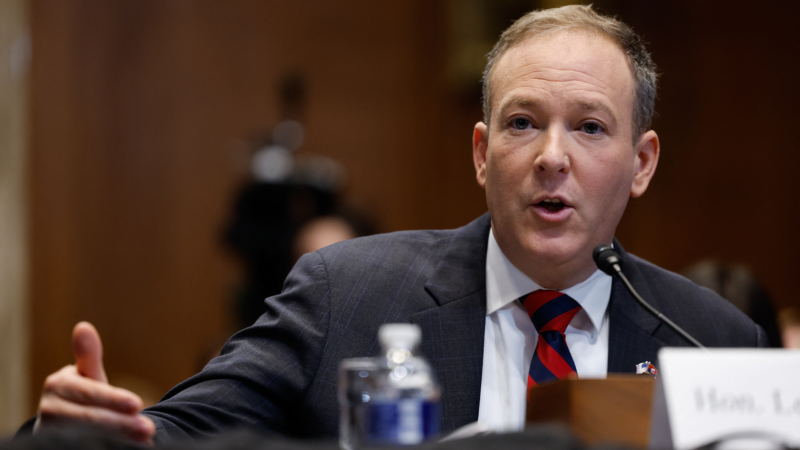EPA announces dozens of environmental regulations it plans to target
The Environmental Protection Agency announced plans to target more than two dozen rules and policies in what the agency called the “most consequential day of deregulation in U.S. history.”
The EPA didn’t provide details about what it wants to do with the regulations — whether it will try to weaken them or eliminate them entirely. In most cases, the agency said it is reconsidering rules that apply to things like climate pollution from vehicles and power plants, wastewater from coal plants and air pollution from the energy and manufacturing sectors.
The list the agency put out is a “roadmap” of the regulations it will try to roll back in the coming year, says Jason Rylander, legal director of the Climate Law Institute at the Center for Biological Diversity, an environmental group.
“This EPA is planning to take a wrecking ball to environmental law as we know it,” he says. “The intent appears to be to neuter EPA’s ability to address climate change and to limit air pollution that affects public health.”
The EPA said in an email to NPR that it doesn’t have additional information to share about its plans for changing or repealing environmental regulations.
“We are driving a dagger straight into the heart of the climate change religion to drive down cost of living for American families, unleash American energy, bring auto jobs back to the U.S. and more,” EPA Administrator Lee Zeldin said in a news release.
Rylander says the agency didn’t have to release a list of rules it plans to challenge. “But they’ve made clear that they intend to start that process,” he says.
Overhauling federal environmental regulations requires a so-called rulemaking process that usually takes a couple of years, Rylander says.
“But we’ve seen that this administration wants to move with a speed that we have not often seen,” he adds. “I suspect that you’ll start seeing proposed rules coming out on each of these in the coming weeks.”
Any effort by the EPA to rollback environmental rules will almost certainly face legal challenges.
“EPA Administrator Lee Zeldin today announced plans for the greatest increase in pollution in decades,” Amanda Leland, executive director of the Environmental Defense Fund, said in a statement. “The result will be more toxic chemicals, more cancers, more asthma attacks, and more dangers for pregnant women and their children. Rather than helping our economy, it will create chaos.”
Leland said her group “will vigorously oppose Administrator Zeldin’s unlawful attack on the public health of the American people that seeks to tear down life-saving clean air standards – putting millions of people in harm’s way.”
EPA says it’s reconsidering rules for power plant emissions
The EPA says it will reconsider rules finalized under the Biden administration that limit climate pollution from power plants.
Power plants are the second biggest source of planet-heating greenhouse gasses behind transportation, according to the EPA. Under the regulations, existing coal and new natural gas-fired power plants that run more than 40% of the time would have to eliminate 90% of their carbon dioxide emissions, the main driver of global warming.
The rules followed a 2022 Supreme Court ruling that limited the EPA’s options for regulating power plant emissions. Justices said that without a specific law, the agency cannot force the entire power generation industry to move away from fossil fuels toward less-polluting energy sources. So, instead, the EPA under the Biden administration created regulations governing individual power plants.
When the new rules were finalized last year, Manish Bapna, chief executive of the Natural Resources Defense Council, predicted they would “drive up investment, innovation, and good jobs in the clean energy economy of the future” and give industry the certainty it “needs to meet growing demand in the cleanest, cheapest, most reliable way possible.”
However, some in the utility industry warned the restrictions would threaten electric reliability.
“The path outlined by the EPA today is unlawful, unrealistic and unachievable,” Jim Matheson, chief executive of the National Rural Electric Cooperative Association in a statement at the time.
Zeldin said in a news release on Wednesday that the EPA is “seeking to ensure that the agency follows the rule of law while providing all Americans with access to reliable and affordable energy.”
Pollution from cars and trucks is also on EPA’s list
President Trump has made it a priority to roll back the Biden administration’s multi-pronged push supporting the transition to electric vehicles. Changing EPA standards limiting air pollution from vehicle tailpipes is a crucial part of that agenda.
Former president Barack Obama toughened fuel economy and EPA vehicle emission standards. During Trump’s first term, automakers had lobbied for looser rules, but were caught off guard by how dramatically Trump rolled them back. The next few years were chaotic; some automakers struck a voluntary deal with California to keep meeting their stricter rules, even if it wasn’t legally necessary.
Under the Biden administration, the standards grew stricter over time with rules designed to accelerate a transition to EVs. The current EPA standards do not mandate a certain number of EVs, but they set emissions rules so strict that automakers would essentially have to manufacture a large portion of vehicles without emissions — as much as two thirds of the vehicles sold by 2032 — in order to meet the rules.
With EV sales growth slowing, some automakers have wondered if that is still feasible and called for the rules to be adjusted. But the industry is also frustrated with the whipsawing of regulations back and forth, which makes it difficult to plan future products. In a statement Wednesday, the trade group representing automakers called for a “balanced approach.”
Environmental and public health groups support the more aggressive standards, which reduce pollution that causes asthma and heart disease as well as fighting climate change. So do consumer advocacy groups: the EPA had also estimated the new rules could save drivers up to a trillion dollars in gasoline over the life of the rules. But many critics, including the oil industry, have said the rules undermine consumer choice by favoring EVs.
EPA says it’s rethinking whether climate pollution endangers public health
Underlying a lot of the EPA’s actions on climate change is a 2009 determination that greenhouse gasses like carbon dioxide and methane threaten public health. The EPA now says it will reconsider that so-called endangerment finding, as well as actions the agency took that were based on the determination.
Daren Bakst, director of the Center for Energy and Environment at the Competitive Enterprise Institute, said in an email to NPR that the EPA has used the endangerment finding to try to “control large portions of the economy.”
If the EPA determines that the endangerment finding is no longer applicable, Bakst says it “would preclude future greenhouse gas regulations.” It could also pave the way to repeal some existing rules, he says.
However, environmental groups say it won’t be easy for the EPA to scrap its determination that greenhouse gas emissions contribute to climate change. The science showing the warming impact of those emissions has only gotten stronger since the Supreme Court authorized the agency in 2007 to regulate greenhouse gas emissions if it finds that they contribute to climate change.
“The state of climate science has evolved significantly since the endangerment finding first came out,” says Rylander, legal director at the Center for Biological Diversity. “I can’t imagine anyone being able to conclude, on the basis of current science, that greenhouse gas pollution does not affect climate and public health. So I’m somewhat baffled that they think they’re going to be able to eliminate it and have that stand up in court.”
Rachel Cleetus, policy director with the Climate and Energy Program at the Union of Concerned Scientists, agrees.
“We’re seeing climate related disasters mount catastrophically,” Cleetus says. “We’ve seen loss of life from wildfires and extremely intensifying hurricanes, floods, droughts. We’re seeing so much economic damage from these kinds of extreme climate related disasters.”
The utility industry has also raised concerns about getting rid of the endangerment finding. In a filing to the U.S. Supreme Court, the Edison Electric Institute (EEI), a group that represents electric utilities, said allowing the EPA to regulate climate pollution creates an orderly system for cutting emissions while minimizing economic impacts on consumers and businesses. Rolling back the agency’s authority could expose companies to a flurry of environmental lawsuits, the group said. “This would be chaos.”
The EPA has repeatedly reaffirmed the endangerment finding, and in 2022, Congress included language in the Inflation Reduction Act that labels greenhouse gases as pollutants under the Clean Air Act.
Conrad Schneider, senior director for the U.S. at the Clean Air Task Force, said in a statement: “This signal to deregulate air pollution is diametrically opposed to the obligation the EPA has to protect public health.”
Yemen’s Southern Transitional Council says it will dissolve after its head fled to UAE
Yemen's Southern Transitional Council and its institutions will be dismantled after weeks of unrest in southern areas and a day after its leader fled to the United Arab Emirates.
National Park Service will void passes with stickers over Trump’s face
The use of an image of Trump on the 2026 pass — rather than the usual picture of nature — has sparked a backlash, sticker protests, and a lawsuit from a conservation group.
Hiring slows in December to end the weakest year of job growth since the pandemic
U.S. employers added 50,000 jobs in December, according to a report from the Labor Department Friday. Measured annually, job gains in 2025 were the slowest since 2020.
Venezuela releases imprisoned opposition figures, which Trump says U.S. requested
Venezuela released a number of imprisoned high-profile opposition figures, activists and journalists, in what the government described as a gesture to "seek peace".
In ‘No Other Choice,’ a loyal worker gets the ax — and starts chopping
In the latest movie from Park Chan-wook, the director behind The Handmaiden and Decision to Leave, a paper factory worker loses his job — and resolves to kill his competition for a new one.
Maduro is out, Congress is in and the quiz is back! Start 2026 with a perfect score
Plus: What's up with Wicked, Greenland, quarters and Jan. 6?







